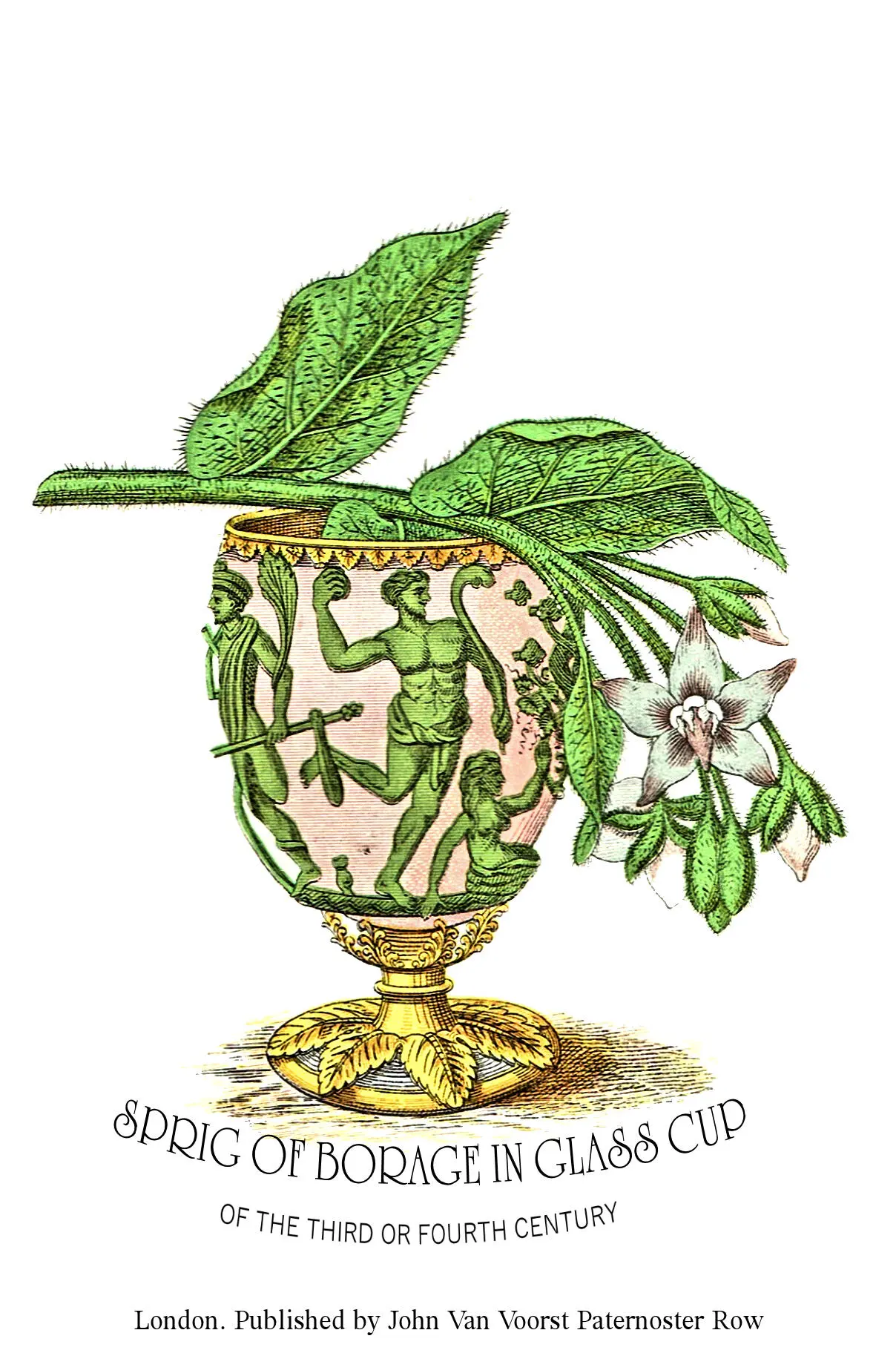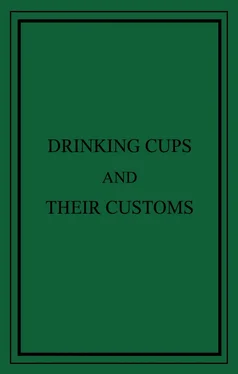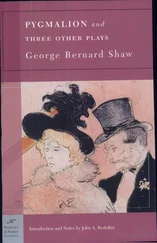This is a reprint of DRINKING CUPS AND THEIR CUSTOMS (second edition) published in 1869 by Henry Porter and George Roberts
Edited and republished in 2018 by Thomas Majhen
Brunnenstraße 42, 10115 Berlin, Germany
t.majhen@outlook.de
Print and distribution: epubli GmbH
www.epubli.de

____________________
„Touch brim! touch foot! the wine is red,
And leaps to the lips of the free;
Our wassail true is quickly said, -
Comrade! I drink to thee!
„Touch foot! touch brim! who cares? who cares?
Brothers in sorrow or glee,
Glory or danger each gallantly shares:
Comrade! I drink to thee!
„Touch brim! touch foot! once again, old friend,
Though the present our last draught be;
We were boys–we are men–we’ll be true to the end:
Brother! I drink to thee!“
_________________________
SECOND EDITION.
LONDON:
JOHN VAN VOORST, PATERNOSTER ROW.
MDCCCLXIX.
PRINTED BY TAYLOR AND FRANCIS,
RED LION COURT, FLEET STREET.
PREFACE
PREFACETO THE SECOND EDITION
CUPS AND THEIR CUSTOMS
HINTS TO CUP-BREWERS
OLD RECIPES
Metheglin
Lamb’s Wool
The Wassail Bowl
MODERN RECIPES
Punch
Noyau Punch
Gin Punch
Whisky Punch
Milk Punch
Milk Punch, No. 2
Regent’s Punch
Cold Milk Punch (German Recipe)
WINE CUPS
Claret Cup, No. 1
Claret Cup, No. 2
Claret Cup, No. 3
Claret Cup, No. 4
Mulled Claret
Burgundy Cup
Hock Cup, No. 1
Hock Cup, No. 2
Hock Cup, No. 3
Hock Cup, No. 4
Hock Cup, No. 5
Champagne Cup
Moselle Cup, No. 1
Moselle Cup, No. 2
Moselle Cup, No. 3
Moselle Cup, No. 4
Moselle Cup, No. 5
Cutler’s Moselle Cup
Mulled Port
Mulled Sherry
Sherry Cobbler
Cider Cup
Morgan’s Herefordshire Cup
Donaldson’s Cider Cup
The “Field” Cider Cup
White’s Club House Cup
Loving Cup
Djonka (a Russian Beverage)
BEER CUPS
Hot Ale Cup
Copus Cup
Donaldson’s Beer Cup
Freemasons’ Cup
Egg Flip
LIQUEURS
Curaçao
Cherry Brandy
Brandy Bitters
Ginger Brandy
Hunting-flask
__________
THE principal object of these pages is to furnish a collection of recipes for the brewing of compound drinks, technically called “Cups”, all of which have been selected with the most scrupulous attention to the rules of gastronomy, and their virtues tested and approved by repeated trials. These we are inclined to put into type, from a belief that, if they were more generally adopted, it would be the means of getting rid of a great deal of that stereotyped drinking which at present hold sway at the festive boards of England. In doing this, we have endeavored to simplify the matter as much as possible, adding such hints and remarks as may prove serviceable to the uninitiated, whilst we have discarded a goodly number of modern compounds as unpalatable and unscientific. As, in this age of progress, most things are raised to the position of a science, we see no reason why Bacchanology, if the term please our readers, should not hold a respectable place, and be entitled to its due mead of praise; so, by way of introduction, we have ventured to take a cursory glance at the customs which have been attached to drinking from the earliest periods to the present time. This, however, we set forth as no elaborate history, but only as an arrangement of such scraps as have from time to time fallen in our way, and have helped us to form ideas of the social manners of bygone times.
We have selected a sprig of Borage for our frontispiece, by reason of the usefulness of that pleasant herb in the flavoring of cups. Elsewhere than in England, plants for flavouring are accounted of rare virtue. So much are they esteemed in the East, that an anti-Brahminical writer, showing the worthlessness of Hindu superstitions, says, “They command you to cut down a living and sweet basil-plant, that you may crown a lifeless stone.” Our use of flavoring-herbs is the reverse of this justly condemned one; for we crop them that hearts may be warmed and life lengthened.
And here we would remark, that although our endeavors are directed towards the resuscitation of better times than those we live in, times of heartier customs and of more genial ways, we raise no lamentation for the departure of the golden age, in the spirit of Hoffmann von Fallersleben, who sings:-
“Would our bottles but grow deeper,
Did our wine but once get cheaper,
Then on earth there might unfold
The golden times, the age of gold!
“But not for us; we are commanded
To go with temperance even-handed.
The golden age is for the dead:
We’ve got the paper age instead!
“For, ah! our bottles still decline,
And daily dearer grows our wine,
And flat and void our pockets fall;
Faith! soon there’ll be no times at all!”
This is rather the cry of those who live that they may drink, than of our wiser selves, who drink that we may live. In truth, we are not dead to the charms of other drinks, in moderation. The apple has had a share of our favor, being recommended to our literary notice by an olden poet–
“Praised and caress’d, the tuneful Phillips sung
Of cyder famed, whence first his laurels sprung;”
and we have looked with a friendly eye upon the wool of a porter-pot, and involuntarily apostrophized it in the words of the old stanza,
“Rise then, my Muse, and to the world proclaim
The mighty charms of porter’s potent name,”
without the least jealous feeling being aroused at the employment of a Muse whose labors ought to be secured solely for humanity; but a cup-drink, little and good, will, for its social and moral qualities, ever hold the chief place in our likings.
Lastly, although we know many of our friends to be first-rate judges of pleasant beverages, yet we believe that but few of them are acquainted with their composition or history in times past. Should, therefore, any hints we may have thrown out assist in adding to the conviviality of the festive board, we feel we shall not have scribbled in vain; and we beg especially to dedicate this bagatelle to all those good souls who have been taught by experience that a firm adhesion to the “pigskin”, and a rattling gallopade to the music of the twanging horn and the melody of the merry Pack, is the best incentive to the enjoyment of all good things, especially good appetite, good fellowship, and
GOOD HEALTH.
. . . . . . And, although alone,
We’ll drain one draught in
Memory of many a joyous
Banquet past.
PREFACE
TO
THE SECOND EDITION.
______________
THE Second Edition of this book contains much additional matter, all of which has been derived from notes collected by one of the original author of the work, whose untimely death is mourned, and whose genial hospitality is remembered, by very many friends. The compiler believes that the additions made will greatly increase the usefulness of the book to all compounders of Cups.
Конец ознакомительного фрагмента.
Текст предоставлен ООО «ЛитРес».
Прочитайте эту книгу целиком, купив полную легальную версию на ЛитРес.
Читать дальше













